The UI Libraries is pleased to announce another new resource: Henry Stewart Talks – The Biomedical & Life Sciences Collection. The Henry Stewart Talks consist of audio-visual presentations (“online seminars by leading world experts”) lasting approximately 20-50 minutes. This collection covers a range of topics in biomedicine and life sciences, including:
- Biochemistry
- Cancer
- Cell Biology
- Diseases, Disorders & Treatments
- Drug Discovery
- Genetics
- Immunology
- Methods
- Microbiology & Virology
- Neurobiology
- Pharmaceutical Science
The collection is regularly updated and expanded and is organized by category, series and therapeutic area. It is also fully searchable. Printable slide handouts (PDF) are available for each talk. Individual talks can be shared via e-mail, Facebook, Twitter and more.
You can find links to the Henry Stewart Talks in the library catalog, Databases A-Z list, and Biology LibGuide. If you use these links (or the links in this blog post), you will be able to access the Henry Stewart Talks from off-campus after you enter your HawkID and password. You can also use InfoHawk+ to find individual talks.
Please contact the Sciences Library if you have any problems, questions or concerns about the Henry Stewart Talks, or if you are interested in learning more about this new resource.
 We depend on weather satellite images daily for our forecasts and travel plans. Without the groundwork laid by the National Earth Satellite Service beginning in 1972, though, these images would not be possible today. A distinguished UI alumnus, George H. Ludwig (BA ’56, MS -59, Ph.D. ’60) was a founding director of NESS and led its operations throughout the 1970s. It is part of Mr. Ludwig’s long and significant career in physics and environmental research, now documented in his papers recently donated to the University Archives.
We depend on weather satellite images daily for our forecasts and travel plans. Without the groundwork laid by the National Earth Satellite Service beginning in 1972, though, these images would not be possible today. A distinguished UI alumnus, George H. Ludwig (BA ’56, MS -59, Ph.D. ’60) was a founding director of NESS and led its operations throughout the 1970s. It is part of Mr. Ludwig’s long and significant career in physics and environmental research, now documented in his papers recently donated to the University Archives.